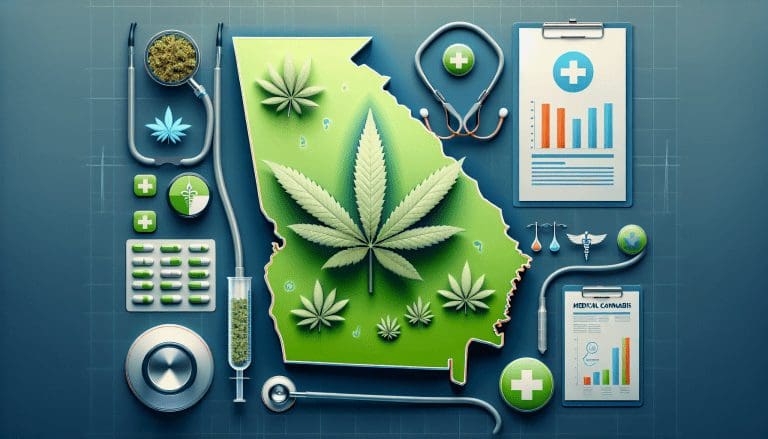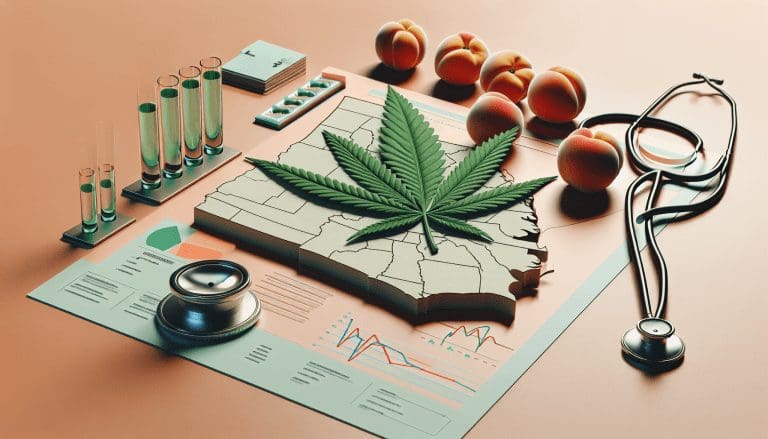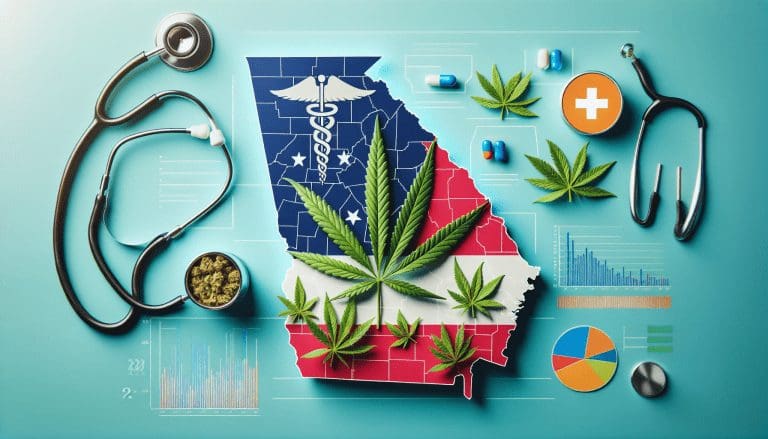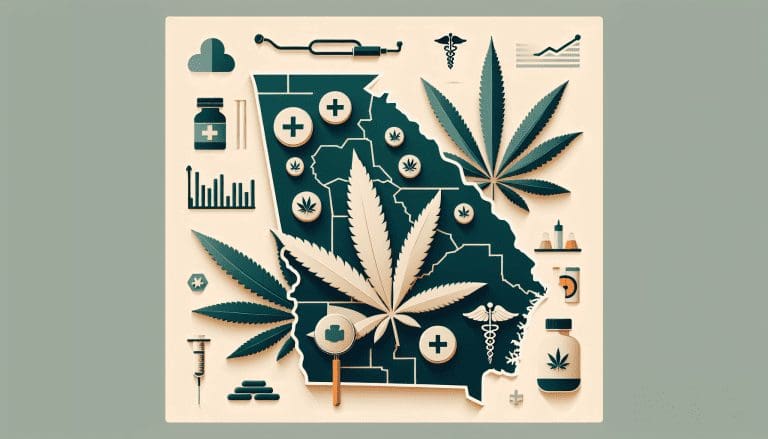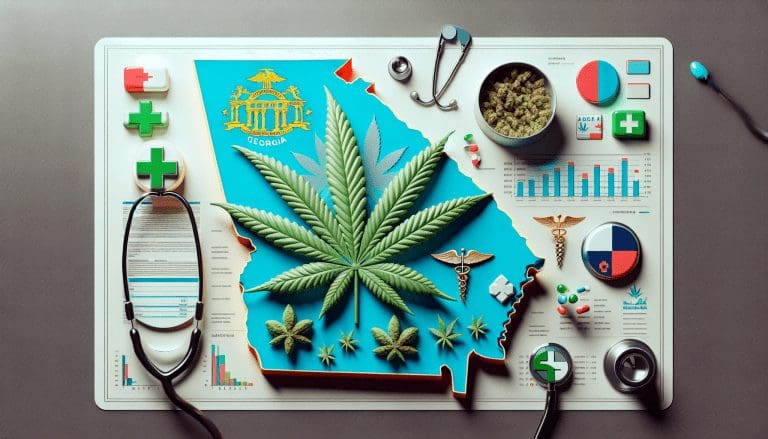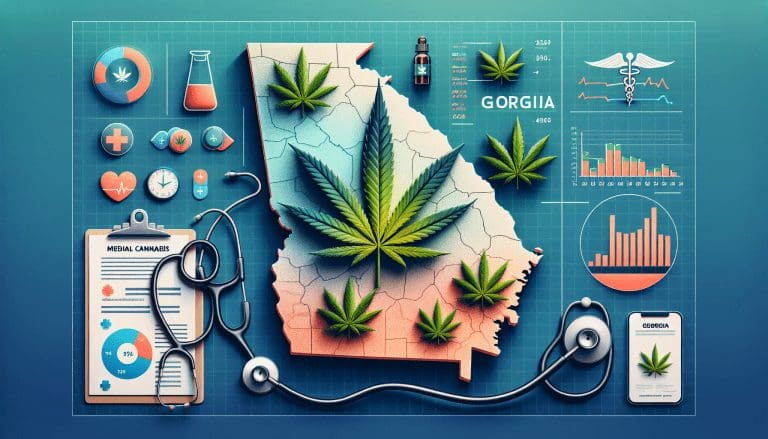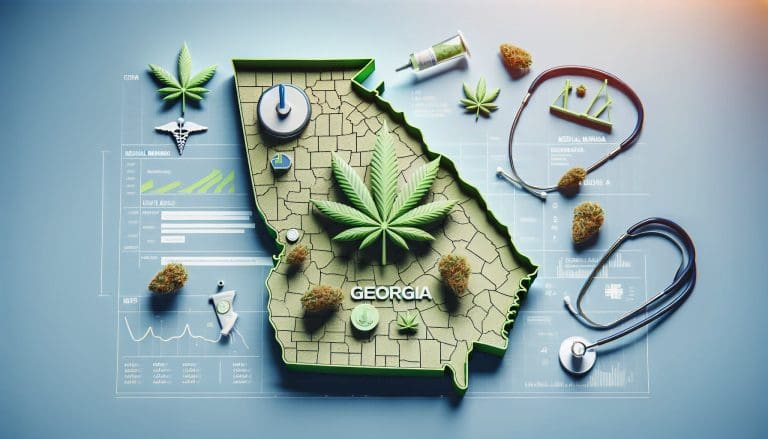Exploring Medical Marijuana in Georgia: Your Comprehensive Guide
Georgia, like many other states in the U.S., has recognized the potential benefits of medical marijuana and has taken steps to make it accessible to those who need it. This guide will provide you with all the information you need to understand the medical marijuana landscape in Georgia.
Is Medical Marijuana Legal In Georgia?
Yes, medical marijuana is legal in Georgia. However, it’s important to note that the state only allows the use of low THC oil, which contains less than 5% THC. The law, known as Haleigh’s Hope Act, was signed into law in 2015 and provides protection for registered patients from prosecution for possession of low THC oil.
How to Get a Medical Marijuana Card in Georgia
To get a medical marijuana card in Georgia, you must first be diagnosed with one of the qualifying conditions. You then need to get a physician’s certification and apply through the Georgia Department of Public Health. The process can be complex, so it’s important to understand all the steps involved. You can find more detailed information on the Georgia Department of Public Health’s website.
Qualifying conditions for Medical Marijuana Cards in Georgia
There are several conditions that qualify for a medical marijuana card in Georgia. These include cancer, ALS, seizure disorders, multiple sclerosis, Crohn’s disease, mitochondrial disease, Parkinson’s disease, sickle cell disease, Tourette’s syndrome, autism spectrum disorder, epidermolysis bullosa, Alzheimer’s disease, AIDS, peripheral neuropathy, and intractable pain. The full list of qualifying conditions can be found on the Georgia Department of Public Health’s website.
Can I Apply For A Medical Marijuana Card In Georgia Online if I am a resident?
Yes, Georgia residents can apply for a medical marijuana card online. The application process is handled by the Georgia Department of Public Health, and all the necessary forms can be found on their website.
What are the costs and requirements to get a marijuana card online in Georgia?
The cost to apply for a medical marijuana card in Georgia is $25. The requirements include being a Georgia resident, having a qualifying condition, and obtaining a physician’s certification. More information can be found on the Georgia Department of Public Health’s website.
How old do I need to be to get a medical marijuana card in Georgia?
You must be at least 18 years old to apply for a medical marijuana card in Georgia. However, parents or legal guardians can apply on behalf of a minor who has a qualifying condition.
Can You Grow Medical Marijuana In Georgia?
No, it is currently illegal to grow marijuana, even for medical purposes, in Georgia.
What are the limits for medical marijuana cards in Georgia?
Registered patients in Georgia are allowed to possess up to 20 fluid ounces of low THC oil. It’s important to note that other forms of marijuana, including the plant form, are not legal in Georgia.
Understanding the medical marijuana laws in Georgia can help ensure that you stay within the legal guidelines while getting the relief you need. Always consult with a healthcare professional before starting any new treatment.
Is Medical Marijuana Legal In Georgia?
Yes, medical marijuana is legal in Georgia. However, the state’s laws surrounding its use are quite restrictive compared to other states where medical marijuana is legal. The Georgia Department of Public Health oversees the state’s Low THC Oil Registry, which allows qualifying patients to legally possess up to 20 fluid ounces of low THC oil, which is derived from the cannabis plant.
Understanding Georgia’s Medical Marijuana Laws
Georgia’s medical marijuana law, known as Haleigh’s Hope Act, was signed into law in 2015. This law allows qualifying patients to possess and use low THC oil. However, it’s important to note that the law does not allow for the cultivation, production, or sale of cannabis in any form within the state. This means that patients must find their own sources for obtaining low THC oil.
Furthermore, the law only allows for the use of low THC oil, which is defined as oil that contains 5% or less THC (the psychoactive component of cannabis) and an amount of CBD (a non-psychoactive component) that is equal to or greater than the amount of THC. This means that other forms of cannabis, such as dried flower or edibles, are not legal under this law.
Qualifying Conditions for Medical Marijuana in Georgia
Not all medical conditions qualify for the use of medical marijuana in Georgia. The state has a specific list of qualifying conditions, which includes severe or end-stage conditions such as cancer, ALS, seizure disorders, multiple sclerosis, Crohn’s disease, mitochondrial disease, Parkinson’s disease, and sickle cell disease. A full list of qualifying conditions can be found on the Georgia Department of Public Health’s website.
Obtaining a Medical Marijuana Card in Georgia
To legally possess low THC oil in Georgia, patients must obtain a Low THC Oil Registry Card from the Georgia Department of Public Health. To qualify, patients must be Georgia residents and have one of the qualifying conditions. They must also have a physician certify that they have a qualifying condition and that they believe the patient may benefit from the use of low THC oil. The physician’s certification must be submitted to the Department of Public Health along with the patient’s application for a registry card.
While medical marijuana is legal in Georgia, it’s important for patients to understand the state’s laws and restrictions. Always consult with a healthcare provider and legal professional to ensure compliance with all laws and regulations.
How to Get a Medical Marijuana Card in Georgia
Georgia is one of the states in the U.S. that has legalized the use of medical marijuana for certain qualifying conditions. However, the process of obtaining a medical marijuana card in Georgia can be a bit complex. This guide will walk you through the steps you need to take to get your card.
Step 1: Check If You Have a Qualifying Condition
Before you can apply for a medical marijuana card in Georgia, you need to have a qualifying condition. According to the Georgia Department of Public Health, these conditions include cancer, ALS, seizure disorders, multiple sclerosis, Crohn’s disease, mitochondrial disease, Parkinson’s disease, sickle cell disease, Tourette’s syndrome, autism spectrum disorder, epidermolysis bullosa, Alzheimer’s disease, AIDS, peripheral neuropathy, and intractable pain.
Step 2: Get a Physician’s Certification
Once you’ve determined that you have a qualifying condition, the next step is to get a certification from a physician. The physician must be registered with the Georgia Department of Public Health’s Low THC Oil Registry. They will need to confirm that you have one of the qualifying conditions and that you could benefit from the use of medical marijuana.
Step 3: Apply for the Card
After you’ve received your physician’s certification, you can apply for the medical marijuana card. You’ll need to fill out an application form and submit it to the Georgia Department of Public Health, along with a copy of your physician’s certification and a $25 application fee. The application can be found on the Georgia Department of Public Health’s website.
Step 4: Receive Your Card
If your application is approved, you’ll receive your medical marijuana card in the mail. This card will allow you to legally possess up to 20 fluid ounces of low THC oil, which is the only form of medical marijuana currently allowed in Georgia.
It’s important to note that while medical marijuana is legal in Georgia, the cultivation of marijuana is not. This means that you’ll need to obtain your low THC oil from a legal source outside of the state.
Getting a medical marijuana card in Georgia can be a lengthy process, but it’s worth it for the potential health benefits. If you have a qualifying condition and think that medical marijuana could help, start the process today.
Qualifying Conditions for Medical Marijuana Cards in Georgia
Georgia is one of the many states in the U.S. that has recognized the potential benefits of medical marijuana for patients suffering from various health conditions. However, not all health conditions qualify for a medical marijuana card in Georgia. This article will provide an in-depth look at the qualifying conditions for a medical marijuana card in Georgia.
What are the Qualifying Conditions?
According to the Georgia Department of Public Health, the following conditions may qualify a patient for a Low THC Oil Registry Card:
- Cancer, when such diagnosis is end stage or the treatment produces related wasting illness, recalcitrant nausea and vomiting
- Seizure disorders related to diagnosis of epilepsy or trauma related head injuries
- Severe or end stage amyotrophic lateral sclerosis (ALS)
- Severe or end stage multiple sclerosis (MS)
- Severe or end stage Parkinson’s disease
- Severe or end stage sickle cell disease
- Crohn’s disease
- Mitochondrial disease
- Severe or end stage Alzheimer’s disease
It’s important to note that the list of qualifying conditions is subject to change as medical research advances and more conditions are found to benefit from medical marijuana treatment.
How to Prove Your Qualifying Condition
To qualify for a medical marijuana card in Georgia, you must provide medical records or documentation from your primary healthcare provider describing your diagnosis. The Georgia Department of Public Health requires this documentation to confirm that you have a qualifying condition.
What if My Condition Isn’t Listed?
If you suffer from a condition not listed above, you may still be eligible for a medical marijuana card in Georgia. The state allows for the submission of a petition to add conditions to the list of qualifying conditions. This process involves providing scientific evidence that medical marijuana can help your condition, as well as testimonials from physicians.
In conclusion, while Georgia has a specific list of qualifying conditions for medical marijuana use, the state is open to expanding this list through scientific evidence and medical testimonials. If you believe you have a condition that could benefit from medical marijuana, it may be worth discussing with your healthcare provider or a medical marijuana expert.
Can I Apply For A Medical Marijuana Card In Georgia Online if I am a resident?
Yes, residents of Georgia can apply for a medical marijuana card online. The Georgia Department of Public Health has made it possible for residents to apply for a Low THC Oil Registry Card, which is the state’s equivalent of a medical marijuana card, through an online process. This card allows qualifying patients to legally possess up to 20 fluid ounces of low THC oil, which is derived from the cannabis plant.
How to Apply Online
To apply for a Low THC Oil Registry Card in Georgia, you must first visit a physician who is registered with the Georgia Department of Public Health’s Low THC Oil Registry. This physician will determine if you have one of the qualifying conditions for medical marijuana use in Georgia. If you do, the physician will certify this information and submit it to the Department of Public Health.
Once the physician’s certification is submitted, you can complete the application process online. You will need to provide your full name, address, and date of birth, as well as a valid form of identification. You will also need to pay a $25 application fee.
After your application is submitted and approved, your Low THC Oil Registry Card will be mailed to you. This card is valid for two years from the date of issue.
Qualifying Conditions
The state of Georgia has a specific list of conditions that qualify for medical marijuana use. These include cancer, ALS, seizure disorders, multiple sclerosis, Crohn’s disease, mitochondrial disease, Parkinson’s disease, sickle cell disease, Tourette’s syndrome, autism spectrum disorder, epidermolysis bullosa, Alzheimer’s disease, AIDS, peripheral neuropathy, and the hospice care patients.
For more information on the application process and the qualifying conditions, you can visit the Georgia Department of Public Health’s website.
Benefits of Applying Online
Applying for a Low THC Oil Registry Card online is a convenient and efficient process. It allows you to complete the application at your own pace and from the comfort of your own home. It also eliminates the need for paper forms and in-person visits to the Department of Public Health.
Remember, having a Low THC Oil Registry Card is the only legal way to possess low THC oil in Georgia. It is important to apply for this card if you are a qualifying patient to avoid legal issues.
For more information on medical marijuana in Georgia, check out our other sections: Exploring Medical Marijuana in Georgia: Your Comprehensive Guide, Is Medical Marijuana Legal In Georgia?, How to Get a Medical Marijuana Card in Georgia, and Qualifying conditions for Medical marijuana cards in Georgia.
What are the costs and requirements to get a marijuana card online in Georgia?
Obtaining a medical marijuana card in Georgia involves a process that includes meeting specific requirements and covering certain costs. This guide will provide you with the necessary information to navigate this process smoothly.
Costs Associated with Getting a Medical Marijuana Card in Georgia
The cost of obtaining a medical marijuana card in Georgia can vary. The state does not charge for the Low THC Oil Registry Card, but there may be costs associated with the doctor’s visit and the application process. It’s important to note that insurance companies do not typically cover these costs as medical marijuana is not recognized at the federal level. Therefore, patients should be prepared to pay out-of-pocket.
Requirements for a Medical Marijuana Card in Georgia
There are several requirements that patients must meet to qualify for a medical marijuana card in Georgia. These include:
- Being a resident of Georgia with proof of residency
- Having a qualifying medical condition as outlined by the Georgia Department of Public Health
- Obtaining a written certification from a physician who has conducted a full assessment of the patient’s medical history
Once these requirements are met, the patient can apply for a Low THC Oil Registry Card, which allows them to legally possess up to 20 fluid ounces of low THC oil.
Applying for a Medical Marijuana Card Online in Georgia
While the state of Georgia does not currently offer an online application process for the Low THC Oil Registry Card, patients can consult with a physician online to obtain the necessary certification. This can be particularly beneficial for patients who have limited mobility or live in remote areas.
It’s important to remember that while medical marijuana is legal in Georgia, the state has strict regulations regarding its use. Patients should ensure they are fully informed about these regulations to avoid legal complications.
For more information about the costs and requirements associated with obtaining a medical marijuana card in Georgia, visit the Georgia Department of Public Health.
How old do I need to be to get a medical marijuana card in Georgia?
In the state of Georgia, the age requirement to obtain a medical marijuana card is 18 years old. However, there are exceptions for minors who suffer from qualifying conditions. In such cases, a parent or legal guardian must apply on their behalf. This is in accordance with the Georgia Department of Public Health’s guidelines on Low THC Oil Registry.
Medical Marijuana and Minors in Georgia
While the general age requirement is 18, Georgia law allows minors to be registered for a medical marijuana card if they suffer from a qualifying condition. The application must be submitted by a parent or legal guardian who is at least 21 years old. The guardian will be issued a card and will be responsible for the minor’s use of medical marijuana. More information on this can be found on the Georgia Department of Public Health’s FAQ page.
Qualifying Conditions for Minors
Minors can qualify for a medical marijuana card in Georgia if they suffer from one or more of the following conditions:
- Cancer
- Amyotrophic lateral sclerosis (ALS)
- Seizure disorders related to epilepsy or head injuries
- Multiple sclerosis
- Crohn’s disease
- Mitochondrial disease
- Parkinson’s disease
- Sickle cell disease
- Tourette’s syndrome
- Autism spectrum disorder
These conditions are outlined in the Georgia Department of Public Health’s guidelines.
Application Process for Minors
The application process for minors is similar to that of adults. The parent or legal guardian must complete the application form and submit it along with the physician’s certification and a $25 application fee. The application can be submitted online through the Georgia Department of Public Health’s Low THC Oil Registry.
It’s important to note that while medical marijuana is legal in Georgia, the use of marijuana for recreational purposes is not. Therefore, the medical marijuana card should only be used for the treatment of the qualifying conditions.
Remember, the laws surrounding medical marijuana can change, so it’s always a good idea to check the latest updates from the Georgia Department of Public Health.
Can You Grow Medical Marijuana In Georgia?
As the use of medical marijuana becomes more accepted across the United States, many patients are asking, “Can I grow my own medical marijuana in Georgia?” The answer, unfortunately, is no. According to the Georgia Department of Public Health, it is currently illegal to grow marijuana in any form in the state of Georgia, even for medicinal purposes.
Understanding Georgia’s Medical Marijuana Laws
Georgia’s medical marijuana laws are quite restrictive compared to other states. The Haleigh’s Hope Act, signed into law in 2015, allows registered patients to possess up to 20 fluid ounces of low THC oil. However, the law does not provide any legal way for patients to obtain the oil within the state. Cultivating marijuana plants, even for the purpose of extracting low THC oil, is still considered a felony.
Penalties for Growing Marijuana in Georgia
Despite the medical benefits of marijuana, the penalties for growing it in Georgia are severe. According to the Georgia Code, cultivation of marijuana is a felony punishable by 1 to 10 years in prison. This applies even if the marijuana is being grown for personal medical use.
Future of Medical Marijuana Cultivation in Georgia
While the current laws are restrictive, there is hope for the future. In 2019, the Georgia Access to Medical Cannabis Commission was established to oversee the production, manufacturing, and dispensing of low THC oil in Georgia. While this does not currently include home cultivation, it is a step in the right direction.
For now, patients in Georgia must rely on obtaining their medical marijuana from other states, which can be legally complex and potentially risky. It is always recommended to consult with a legal professional or a trusted medical marijuana advisor before making any decisions.
Stay updated on the latest changes in Georgia’s medical marijuana laws by visiting the Georgia Department of Public Health website regularly.
Remember, while the use of medical marijuana is becoming more accepted, it is still regulated by both state and federal laws. Always ensure you are in compliance with all laws to avoid any potential legal issues.
What are the limits for medical marijuana cards in Georgia?
Georgia has a specific set of rules and regulations regarding the use of medical marijuana. Understanding these limits is crucial for patients seeking to use cannabis for medical purposes. This guide will provide an overview of the limits for medical marijuana cards in Georgia.
Low THC Oil Registry Card
In Georgia, the Low THC Oil Registry Card is the equivalent of a medical marijuana card. This card allows qualifying patients to possess up to 20 fluid ounces of low THC oil, which is defined as oil that contains 5% or less THC and an amount of CBD equal to or greater than the amount of THC. It’s important to note that other forms of cannabis, such as flower or edibles, are not legal in Georgia, even for medical purposes.
Qualifying Conditions
Not everyone can apply for a Low THC Oil Registry Card in Georgia. The state has a list of qualifying conditions that includes severe or end-stage illnesses such as cancer, ALS, Parkinson’s disease, and epilepsy, among others. If a patient’s condition is not on this list, they are not eligible for a card.
Application Process
The application process for a Low THC Oil Registry Card in Georgia involves a certification from a physician, a waiver signed by the patient, and a $25 application fee. The card is valid for two years from the date of issue. Patients must also be residents of Georgia to apply.
Limitations and Restrictions
While the Low THC Oil Registry Card allows patients to possess low THC oil, it does not permit them to cultivate cannabis plants or purchase cannabis in its raw or dried form. Additionally, the card does not protect patients from federal law, which still classifies cannabis as a Schedule I drug. It’s also important to note that Georgia does not have a reciprocity program, meaning that medical marijuana cards from other states are not recognized in Georgia.
In conclusion, while Georgia does allow for the use of low THC oil for certain medical conditions, the state’s medical marijuana program has strict limitations. Patients should be aware of these restrictions and consult with a healthcare provider to determine if medical marijuana is the right treatment option for them.

